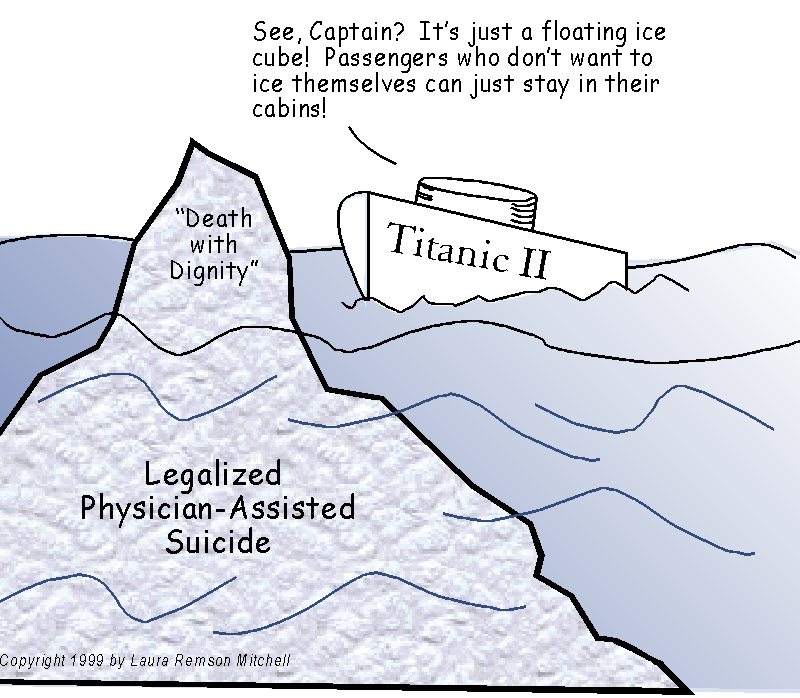
Public Policy Implications of Legalizing Physician-Assisted Suicide
The purpose of this page is to examine the public policy implications
of legalizing physician-assisted suicide. It is worth noting that several
national organizations of persons with disabilities, ranging from mainstream
to militant, have adopted positions officially opposing legalization of
physician-assisted suicide. These groups include the National Council on
Disability (NCD), the National Council on Independent Living, Justice for
All, ADAPT and Not Dead Yet, an organization of individuals with severe
disabilities who strongly oppose legalization of physican-assisted suicide.
In addition to my concerns about the public policy implications of legalizing
physican-assisted suicide, I also agree with many of the points raised
by the NCD, Not Dead Yet and other disability groups that see in legalization
a special danger for people with disabilities and chronic illnesses.
For more information on the disability opposition to physican-assisted
suicide, visit Not Dead Yet's
Web site. The California Disability
Alliance also has a web site with useful information and links on this
topic.
Click here to view an excerpt from the National Council on Disability Bulletin
announcing the NCD position on physican-assisted
suicide.
 D-1
D-1

Table of Contents
- Red Flag on the Slippery Slope
My commentary in the Los Angeles Times, published Feb. 2, 1998. The
story also has appeared in some other newspapers under different headlines.
(This article is Copyright © 1998 by Laura Remson
Mitchell)
- Letter to Daily News
A slightly edited version of a letter I sent to the Daily News Los
Angeles in response to the paper's request for answers to the question:
"Should California follow Oregon's lead and legalize doctor-assisted suicide."
(The published letter appeared on the Daily News Public Forum page on Nov.15,
1997.)
- Whose
Right To Die?
This excellent article by Ezekiel Emanuel appeared in the March 1997
issue of The Atlantic Monthly. Emanuel examines the arguments
for legalization and comes to his own conclusions. I consider this
one of the best and most thoughtful discussions of the issue I have seen
anywhere. Unfortunately, the last time I checked (Oct. 31, 2004), access to
this article was limited to registered subscribers. [Please note that this
link will take you out of LRM's Place. To return, press the back button on
your browser.]
- Assisted
Suicide: A Disability Perspective
Report on assisted suicide by the National Council on Disability. [Please
note that this link will take you out of LRM's Place. To return, press
the back button on your browser.]
- Physician-assisted
suicide: When pain trails other concerns ... American Medical News
Editorial from American Medical News: March 19, 2001. This link will
take you to the American Medical News web site. [Please note that
this link will take you out of LRM's Place. To return, press the back button
on your browser.]
- Suicide Prevention Double Standard
Excludes Disabled
This commentary, from the May 29, 2001, issue of the Daily News Los
Angeles, isn't specifically about legalization of physician-assisted suicide,
but it touches on related matters, primarily in response to U.S. Surgeon
General David Satcher's call for a national strategy against suicide, now
a leading cause of death in the United States.
- CFILC
briefing on euthanasia
Analysis of the issue by California Foundation For Independent Living
Centers. (Published in 2000. Link posted on this page
5-17-02.)
Letter to Daily News
[As a public policy analyst and a woman with multiple
sclerosis (MS), I want to say emphatically that] California should not
legalize doctor-assisted suicide!
Contrary to popular impressions, legalizing doctor-assisted
suicide involves much more than personal autonomy or morality. It's a matter
of public policy, and it would have implications and ramifications that
extend far beyond individual choice. In fact, legalizing assisted suicide
ultimately would turn the "right to die" into a "duty to die," especially
for people with disabilities and serious chronic illnesses like MS.
It is clear from experience that there is a serious
risk of abuse and that physicians and family members, rather than patients,
are likely to be the real decision makers. But less well recognized are
the subtle and indirect ways in which legalization would affect health care
for everyone.
In a world of legalized physician-assisted suicide, would
a health plan pay $10,000 a year for me to take an MS medication that could
prevent or slow progression of the disease, or would the plan simply exclude
that treatment, wait until my condition worsened to a point that I found
intolerable, and then "compassionately," cover the cost of my doctor-assisted
suicide? And with coverage of expensive new treatments curtailed or excluded
(effectively destroying the market for any resulting product), why would
anyone invest in research and development for new treatments? Similar questions
can be asked regarding other conditions as well.
Rather than legalizing doctor-assisted suicide, we
should be improving the quality and availability of palliative care for terminally
ill patients and of support services for family caregivers and for individuals
with disabilities and serious chronic illnesses.
Laura Remson Mitchell

Go to the Table of Contents for this page.
Number of visitors to this page since Feb. 14, 1998:

This page is Copyright © 1998-2006 by Laura
Remson Mitchell
E-mail: dhcpolwnk@
hotpop.com or af752@lafn.org.
This page was last revised on June 12, 2006.
Return to LRM's Home Page
LRM's Place has
been honored with the "Top of the Hill" Award
by Geocities/Capitol Hill.

[Geoguide may appear below. See Accessibility Note page for more information.]



